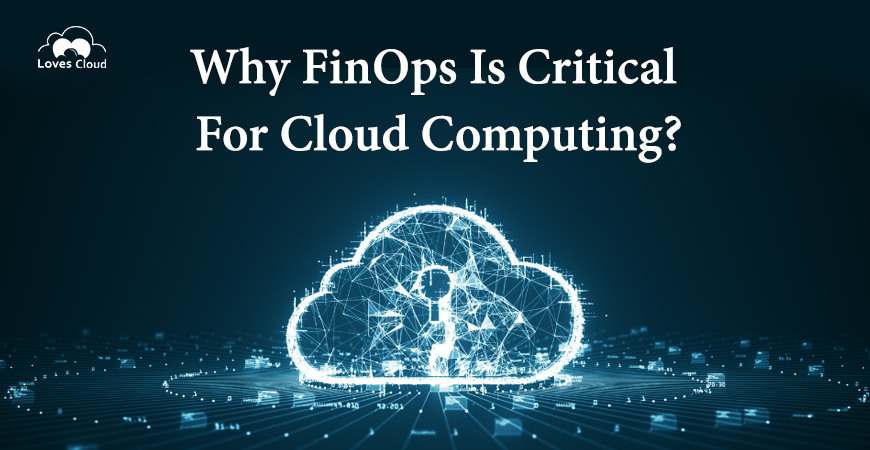
Why FinOps Is Critical For Cloud Computing?
As businesses continue to move more of their operations onto the cloud, a relatively new term is emerging in the industry: FinOps. FinOps, short for Financial Operations, is becoming increasingly important for organizations that are looking to get the most out of their cloud-based infrastructure.
In this article, we take a look at what FinOps is, why it’s so critical for cloud computing, and how companies can benefit from its implementation. We’ll also discuss some considerations when evaluating your own needs related to FinOps.
Keep reading to learn more about FinOps and its advantages.
What Is Cloud FinOps?
Cloud FinOps is a process that combines the traditional financial operations of an organization with cloud technology. This is done to optimize their costs and identify opportunities for cost-savings, as well as drive value realization through cloud transformation.
FinOps helps organizations understand the complexity and challenges associated with traditional IT financial management. It also provides visibility into how various cloud services are being used and how they impact the organization.
Furthermore, FinOps helps identify the key success metrics for business value realization by leveraging insights from historical data, usage patterns, and operational costs. This enables organizations to drive financial accountability and maximize their return on investment in cloud technology.
Benefits of Cloud FinOps
Cloud FinOps comes with a myriad of benefits for organizations worldwide. To give you a quick overview, here’s a list of the common advantages of using FinOps in your operations:
1. Improved Cost Control
Cloud FinOps provides organizations with a detailed understanding of the costs associated with their cloud services, enabling them to manage their spending more effectively. This includes identifying areas where costs can be optimized or reduced, as well as specific cost-saving strategies that can be implemented.
2. Increased Efficiency
As cloud services become more complex, FinOps helps organizations manage their costs in a way that maximizes efficiency. This includes optimizing processes and automating routine tasks to reduce manual labor and streamline operations.
3. Unified Workplace
FinOps helps bridge the gap between DevOps, IT, and Finance teams by providing a unified view of cloud costs across all departments. This allows for better collaboration and communication between teams to work towards a common goal.
4. Empowered Cloud Engineers
Cloud computing is becoming the preferred choice for many engineers for its scalability, flexibility, and cost-effectiveness. With cloud computing, engineers can access high-performance virtualized resources from anywhere in the world, eliminating the need to invest in physical infrastructure. By providing clear visibility and control over costs, FinOps empowers cloud engineers to focus on agile, faster deployment and bug-free delivery without worrying about storage space availability and computing power.
How To Implement FinOps
Implementing FinOps can be a daunting task for many organizations, but with the right tools and strategies, it can become a lot more manageable. Here are some of the key steps to consider when setting up your own FinOps system:
1. Track Your Costs
The first step is to ensure that everybody knows where money is spent on the cloud. This step will provide you with detailed visibility into all costs associated with cloud services, as well as the ability to include all stakeholders to work towards a common goal.
2. Tagging
Tagging helps businesses organize their cloud costs into “buckets” that can be easily identified, measured, and monitored. By tagging resources with specific labels, FinOps teams can more effectively track and manage cloud costs.
3. SaaS Startup Valuation
FinOps professionals also need to consider how their cloud services affect SaaS startup valuations, as this can often be a major factor in determining the overall cost-effectiveness of cloud solutions. By understanding the underlying economics associated with SaaS, FinOps professionals can better understand and manage the overall cost of their cloud solutions.
Key Building Blocks of Effective Cloud FinOps
In order to properly implement and benefit from FinOps, organizations need to understand the key building blocks that go into its implementation. The most important ones are:
1. Cost Optimization
Cost optimization is the process of identifying areas where costs can be reduced or optimized within an organization’s cloud environment. This includes reviewing and adjusting service configurations, selecting the right type of storage, evaluating usage patterns to optimize performance, and more.
2. Accountability and Enablement
Financial accountability is a must in order to ensure that cloud costs are managed effectively. FinOps provides the necessary visibility and control over cloud resources, enabling organizations to take ownership of their own usage and spending.
3. Automation
Cloud FinOps enables organizations to automate certain processes in order to streamline operations, reduce manual labor, and ultimately save time and money. Examples of automated tasks include provisioning, deployments, resource scheduling, and cost optimization.
4. Measurement and Business Value Realization
The key to effective cloud cost management is understanding the metrics that matter most for business value realization. This includes looking at historical usage data, forecasting future trends, and tracking critical performance indicators such as uptime and latency. By evaluating these factors, organizations can determine which services are providing the most value and optimize their cloud environment accordingly.
5. Planning and Forecasting
Cloud FinOps includes long-term planning and forecasting, which helps organizations better understand their future needs and adjust their cloud costs accordingly. This includes resource scheduling, capacity planning, and budgeting for future projects.
Closing Thoughts
FinOps is becoming increasingly important in today’s highly competitive cloud computing landscape. By providing visibility and control into cloud costs, organizations can ensure they are getting the most out of their investments and effectively managing their infrastructure. As the industry continues to evolve, FinOps will continue to be a critical component of any successful cloud strategy.

